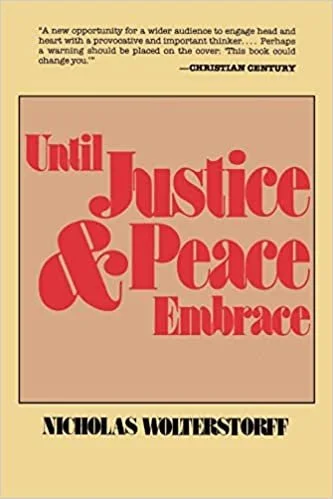Until Justice & Peace Embrace (Part 1)
Two weeks ago I posted a video of Nicholas Wolterstorff speaking on the topic of justice in Scripture. At that time I mentioned being in the middle of his book Until Justice and Peace Embrace, and that I expected to finish reading it in about three years. Well, I’m happy to say I finished ahead of schedule. I had every intention of keeping this brief, but the book is simply so full of such rich material that I had to turn it into a three-part series. For anyone concerned with the intersections of faith, development, justice and peace — as I am — Wolterstorff gives us a lot to chew on. Here is some of what I found most helpful, broken down in bite-size pieces.
Appropriating the Reformed tradition
The book began as the Kuyper Lectures at the Free University of Amsterdam thirty years ago, and as Wolterstorff explains in the preface, the ideas he presented were an attempt to appropriate the Reformed/Presbyterian tradition to which he and many in his audience belonged. “Appropriation of one’s tradition implies neither uncritical acceptance nor total rejection,” he writes. “It entails a discriminating adaptation of its features to one’s own situation.”
World-formative vs. avertive traditions
The Reformed/neo-Calvinist tradition at its best, he says, is a world-formative tradition, as opposed to an avertive one, such as the predominant Medieval expression of Christianity. He spends a chapter articulating the difference between the two kinds of traditions, but in a nutshell, world-formative traditions (Reformed and otherwise) believe that faithfulness to God requires active involvement in society.
Lima, Amsterdam and beyond
Liberation theology emerged within the Catholic Church in revolutionary Latin America during the second half of the twentieth century. It too is a world-formative tradition, focused on theologizing through the eyes of the poor, and working for political liberation from rampant injustice — even, if necessary, through violent means. Liberation theology and neo-Calvinism have some similarities beyond the fact that they’re both world-formative, Wolterstorff says, but they also have a key difference, and it’s a fascinating one to me: one (liberation) views societal problems through the category of sin; the other (neo-Calvinism) through the category of idolatry. Which is right? Can you pick one?
We do in fact live in a world-system in which the core dominates the periphery, characteristically out of greed and a lust for power. What is that but sin? We do in fact live in a world-system shaped by the practice of treating economic growth as an autonomous and ultimate good. What is that but idolatry?
Both frameworks have validity, Wolterstorff argues, and both correct deficiencies in the other. And this is where I am so impressed with him for appropriating his own tradition, just as he said. He doesn’t uncritically accept it or totally reject it. But he called his audience in Amsterdam, and he calls you and me today, to a vision beyond either of these two world-formative traditions. What is that vision?
Shalom
Shalom, he writes, “is both God’s cause in the world and our human calling.” It’s “intertwined” with justice but distinct from it:
In shalom, each person enjoys justice, enjoys his or her rights. There is no shalom without justice. But shalom goes beyond justice. Shalom is the human being dwelling at peace in all his or her relationships… But the peace which is shalom is not merely the absence of hostility, not merely being in right relationship. Shalom at its highest is enjoyment in one’s relationships… To dwell in shalom is to enjoy living before God, to enjoy living in one’s physical surroundings, to enjoy living with one’s fellows, to enjoy life with oneself.
Because shalom is about right relationships, it’s about ethics and responsibility. But if enjoyment and delight are missing, it’s not shalom. That’s a pretty compelling vision, if you ask me. We’ll explore some of its ramifications tomorrow.
